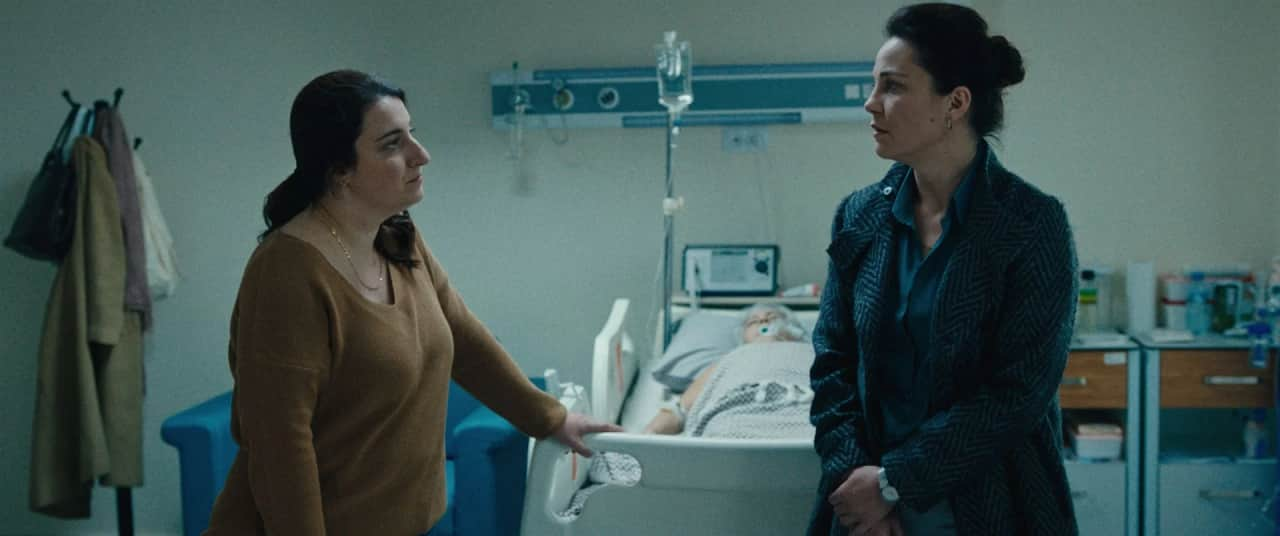



Selman Nacar’s sophomore Hesitation Wound is a day in the life of a criminal lawyer who’s also a daughter. It treads the grey areas skillfully, between truth and lies, ambition and renunciation. In the well-crafted, compelling, suspenseful drama, the hyper-committed Canan (Tülin Özen) straddles the personal and the professional, like a ping pong ball, trying to be on top of either situation, by her comatose mother’s side at the hospital (on life support but her organs are healthy) and her murder-suspect client at the prison and courthouse. In both spheres, she has to make some hard decisions, a moral choice that will impact others’ lives, as she stands on the threshold between a breakthrough or breakdown. Spatially expansive, temporally compressed, Nacar’s films close in on, and build the tension for, the protagonists.
 A still from 'Hesitation Wound'.
A still from 'Hesitation Wound'.
The Venice (Orizzonti)-premiered Hesitation Wound recently won the top Feature Film Competition prize at 19th Zurich Film Festival. “Getting the Golden Eye at Zurich Film Festival was a big honour, especially from a jury that I appreciate,” says the Istanbul-based director. With his Turkish drama, Nacar is visiting India with a film for the first time, in the World Cinema segment at the 23rd Jio MAMI Mumbai Film Festival, this weekend, October 28-29. Although his debut film Between Two Dawns (2021) won the Best International Film award at 20th Pune International Film Festival last year. He’s “excited to see India and Indian audiences’ reaction. I see many similarities in both Indian and Turkish cultures, and I hope audience will deeply feel the film,” says Nacar, 33. The film is also travelling to Tallinn, Stockholm, Free Zone, Arras, among other festivals. Nacar speaks about his new film, the similarity in law and filmmaking, and moral dilemmas at the centre of his work. Edited excerpts from an interview:
You studied to become a lawyer? The wry, rules-bound, practical field of law is starkly different from the fluid, imaginative, creative field of the arts. How did you decide on becoming a filmmaker and why did you feel cinema would be your best medium of expression?
As an idealistic young man, I believed that I could bring about change in society with my knowledge of law and that it was my duty to strive for a more just and peaceful life. However, until the moment I decided to pursue cinema as a profession, there was a huge void inside me that I could not describe. For years, I changed cities, countries and universities in search of it, and when I met cinema, this emptiness was suddenly and definitively filled. Those who live in big cities may be familiar with movie sets, but as someone who grew up in Uşak, I saw a movie set for the first time in my life when I was walking in Galata after I started university. I felt that cinema was a profession that fully reflected my personality with its nourishment from many art branches, its philosophical background and field aspect based on organisation. I continued my education in both law and cinema. I was working at the same time. It was a difficult process. I didn’t have much time to sit and have a coffee on campus. I shot Kuyu (The Well, 2015), my first short film, in my third year of university, when I was accepted to Columbia (University, New York) for my Master’s degree. In my third year at Columbia, I shot Between Two Dawns (2021).
School was never a place that restricted me, it (filmmaking) continued alongside life. At first, I was very uncomfortable with revealing my legal identity. I wanted to be known only as a filmmaker, so I always avoided that in the things I wrote. In the five short films I made until Between Two Dawns, I experimented with different things and became more at peace with myself. In Between Two Dawns, the issue of law and morality became the basis of the film. The main character of Hesitation Wound is also a criminal lawyer. But I can say that the contribution of my law education was more to gain analytical thinking skills. When making a movie, I see the journey of transforming what you imagine into a text on paper and then into an image shot with a camera as placing the pieces of a puzzle. The same feeling is present when approaching a legal problem. In this sense, I can say that they are very similar. Apart from that, I think the fact that I examine issues such as morality, ethics and law in my films is not because I studied law, but because of my character. These are concepts that I put at the centre of my life and think about, regardless of everything else.
 A still from 'Hesitation Wound'.
A still from 'Hesitation Wound'.
How many court procedurals did you attend to write this film?
For almost a year, I regularly visited courthouses while writing the story. Later, I revisited them with my team and my actors. It was important because the film is both a courtroom drama and a personal drama focusing on a moral crisis in Canan’s life. In structuring the film, I tried to find the right balance because, from the outset, my intention was to plumb the depths of the interconnected issues and to illustrate how their interplay weaves intricate complications. I hold the belief that the collision of our intellect and emotions, our professional commitments and personal aspirations, our needs and wants, engenders an authenticity that resonates profoundly. Yet, conceiving a structure for the film that effectively encapsulated these notions proved to be one of the most formidable challenges.
Contemplations abounded on pivotal aspects: which narrative strand to inaugurate, when to seamlessly transition between them, and how to achieve the precise cadence and emotional resonance throughout the script, filming, and editing processes. The pivotal juncture lay in the interconnectedness of these narratives — a juncture that materialises with an elegant complexity. While the stories unfold parallelly, their interconnectedness is far from direct; rather, it’s a web of nuanced causality. An indelible thread invisibly binds them, forming a helix of association.
Take, for instance, the ripple effect: the fervour of the courtroom clash reverberates in the hospital conversation, and the helplessness in aiding her mother amplifies her determination to rescue the prisoner. These connections aren’t overt, but their influence is undeniable, illustrating an intricate dance between the storylines. In essence, each tale exists as a vital complement to the other, a symphony where every note, however subtle, contributes to the harmonious whole. This intricate choreography of storytelling, where events intertwine like a spiral, epitomises my endeavour to craft a narrative that resonates on multiple levels and captivates viewers in its intricate embrace.
 A still from 'Hesitation Wound'.
A still from 'Hesitation Wound'.
What is it about morality-driven thrillers that interests you?
These concepts have interested me ever since my student years at the faculty of law. I’ve always found our inability to immediately come to a certain conclusion regarding problems, and the opportunity that allows us to observe them from multiple perspectives, to be very cinematic. Thus, I wanted to portray the moments in which a character who faces a moral struggle, trapped between their conscience, their family, and their dreams. There have been many times where I’ve felt stuck among difficult decisions I’ve had to make. In such times, one is forced to think through many different perspectives in a very short time and gets so frustrated that it seems as if there is nothing more comforting than shouting into a well.
Are your films commentary on the social reality or personal documents?
I don’t think cinema can fully answer almost any question. I even observe that movies that try to respond to something fall below their potential because of this effort. However, I am of the opinion that cinema is a very good tool to ask questions and that the changes you’ve mentioned are achieved through making the audience ponder about these questions. In short, cinema can have an indirect and profound effect, instead of a direct and superficial one.
 Turkish actor Tülin Özen at Venice International Film Festival. Özen plays protagonist Canan in 'Hesitation Wound', screening at Mumbai Film Festival. (Photo: Stephanie Cornfield)
Turkish actor Tülin Özen at Venice International Film Festival. Özen plays protagonist Canan in 'Hesitation Wound', screening at Mumbai Film Festival. (Photo: Stephanie Cornfield)
Talk about Tülin Özen and finding your protagonist, the criminal lawyer Canan who stands on the threshold of either a breakthrough or breakdown, in her.
I conducted numerous auditions to find the perfect embodiment for such a pivotal character. Tülin has a remarkable blend of exceptional character and acting prowess. What truly clinched the decision was her unwavering connection with the story and the character itself. Over the course of nearly a year, we embarked on an immersive journey, traversing to and from the courtrooms, engaging in countless dialogues about the character’s essence and the narrative’s soul. Tülin seamlessly shed her own persona and stepped into Canan’s shoes, dissolving the boundary between reality and portrayal, it enabled me to sculpt and refine even the most delicate moments on screen and explore subtle nuances. Tülin’s artistic commitment and resilience, her unyielding dedication to shaping the character’s trajectory and grasp of the character, are unparalleled. Her presence was a wellspring of reassurance amid the challenges.
Talk about working with Romanian cinematographer Tudor Vladimir Panduru and the long takes. The camera dollies into the Istanbul city at the start of the film and tracks out of it at the end, like making an entry and exit into a world, and into the character’s mind.
Tudor and I share a profound camaraderie since my debut feature Between Two Dawns. Our conversations are marked by dissecting the layers of meaning in each scene and the expansive canvas of camera movements. Our endeavour in this film rested in the quest for the perfect locations. Given our penchant for long takes, it was imperative that our chosen settings aligned with the technical demands. Yet, their significance extended beyond mere functionality; they were integral contributors to the narrative. Each location served as a visual metaphor, unfurling additional dimensions to the intricate tapestry of themes woven throughout the film. On set, the challenge, lay in discovering the precise mise-en-scène that resonated authentically with the scene and was an embodiment of the narrative’s essence.
 A still from 'Between Two Dawns' (2021).
A still from 'Between Two Dawns' (2021).
What are you working on next?
I’m directing a Netflix series that I have written.
Discover the latest Business News, Sensex, and Nifty updates. Obtain Personal Finance insights, tax queries, and expert opinions on Moneycontrol or download the Moneycontrol App to stay updated!